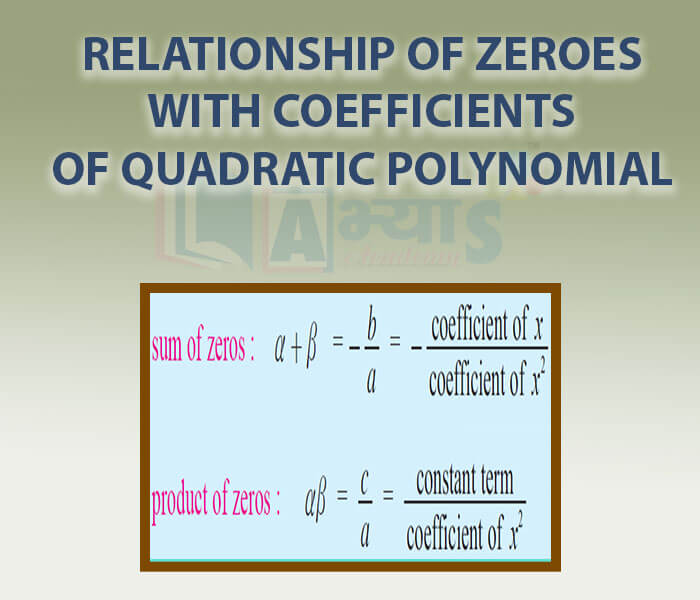Relationship of Zeroes With Coefficients of Quadratic Polynomial


Relationship of Zeroes With Coefficients of Quadratic Polynomial
Relationship of Zeroes With Coefficients Of Quadratic Polynomial:
If (read as alpha) is a zero of p(x) then
If and
( read as beta) are two zeroes of p(x) then
We can use these reltaions to obtain values of several symmetric expressions involving and
in terms of a, b and c.
An expressons in and
is said to be symmetric if it remaiins unchanged when
and
are intercharged. For instance,
and
are symmetric expressions in
and
.
Example: If a and c are such that the quadratic polynomial has 10 as the sum of zeroes and also as the product of zeroes, fiind a and c.
Solution: Let be the zeroes of
Then
As we get
and c = 10a = 5
Thus,
Example : If and
are zeros of the quadratic polynomial
. find the value of
Solution:
We first find We have
Next
Thus,
Example: If are zeros of
then obtain quadratic polynomials whose zeros are
Solution: As are zeros of
Thus, the quadratic expression whose zeros are is
or
or
For which value of 'a' will the polynomial | |||
| Right Option : B | |||
| View Explanation | |||
Students / Parents Reviews [10]
About Abhyas metholodology the teachers are very nice and hardworking toward students.The Centre Head Mrs Anu Sethi is also a brilliant teacher.Abhyas has taught me how to overcome problems and has always taken my doubts and suppoeted me.

Shreya Shrivastava
8thIt was good as the experience because as we had come here we had been improved in a such envirnment created here.Extra is taught which is beneficial for future.

Eshan Arora
8thA marvelous experience with Abhyas. I am glad to share that my ward has achieved more than enough at the Ambala ABHYAS centre. Years have passed on and more and more he has gained. May the centre flourish and develop day by day by the grace of God.

Archit Segal
7thAbhyas is a complete education Institute. Here extreme care is taken by teacher with the help of regular exam. Extra classes also conducted by the institute, if the student is weak.

Om Umang
10thMy experience with Abhyas academy is very good. I did not think that my every subject coming here will be so strong. The main thing is that the online tests had made me learn here more things.

Hiya Gupta
8thMy experience with Abhyas is very good. I have learnt many things here like vedic maths and reasoning also. Teachers here first take our doubts and then there are assignments to verify our weak points.

Shivam Rana
7thOne of the best institutes to develope a child interest in studies.Provides SST and English knowledge also unlike other institutes. Teachers are co operative and friendly online tests andPPT develope practical knowledge also.

Aman Kumar Shrivastava
10thMy experience was very good with Abhyas academy. I am studying here from 6th class and I am satisfied by its results in my life. I improved a lot here ahead of school syllabus.

Ayan Ghosh
8thBeing a parent, I saw my daughter improvement in her studies by seeing a good result in all day to day compititive exam TMO, NSO, IEO etc and as well as studies. I have got a fruitful result from my daughter.

Prisha Gupta
8thIt was a good experience with Abhyas Academy. I even faced problems in starting but slowly and steadily overcomed. Especially reasoning classes helped me a lot.
